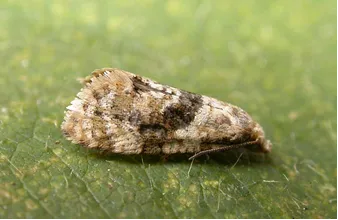JACKSONVILLE, Fla. - U.S. Customs and Border Protection (CBP) Office of Field Operations (OFO) agriculture specialists in Jacksonville discovered a potentially destructive pest while inspecting a shipment of used vehicles from Germany. The U.S. Department of Agriculture has confirmed that this marks the first interception of this pest in the United States.
CBP agriculture specialists made the finding sifting through littered plant debris hidden inside a wheel well. Phalonidia sp. (Tortricidae) are considered serious pests often feeding on fruits of commercially important crops such as apples and peaches.
CBP agriculture specialists have extensive training and experience in the biological sciences and agricultural inspection. Each year, agriculture specialists intercept tens of thousands of “actionable pests” – those identified through scientific risk assessment and study as being dangerous to the health and safety of U.S. agricultural resources.
“Agriculture specialists are the first line of defense in the protection of American agriculture in Jacksonville and across the United States," said CBP Jacksonville Port Director Jennifer Bradshaw. "CBP's Office of Field Operations in northern Florida continues to be at the forefront in the detection of foreign invasive plants and plant pests."
CBP’s Office of Field Operations
Almost a million times each day, CBP officers welcome international travelers into the U.S. In screening both foreign visitors and returning U.S. citizens, CBP uses a variety of techniques to intercept narcotics, unreported currency, weapons, prohibited agriculture, and other illicit products, and to assure that global tourism remains safe and strong.
On a typical day across the country, CBP agriculture specialists intercept 4,638 prohibited meat, plant materials or animal products, including 404 agriculture pests and diseases.
To find out more about CBP operations in Florida, visit @CBPFlorida on Twitter.
Watch this video to learn more about CBP and its tremendously complex and important mission.
Download U.S. Customs and Border Protection stock footage from DVIDS - Defense Video & Imagery Distribution System.

